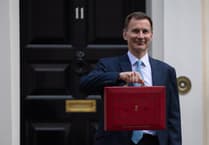As the dust settles on our first coronation in 70 years, I remember a conversation I had with the Canadian finance minister a couple of weeks ago.
We talked about why Canada was happy to have the new sovereign’s head on some of its dollar bills and she said that for Canadians, as for all of us, the monarchy represented stability and continuity.
It is hard to explain why, in an age of democratic ideals, we would install a hereditary head of state – until you consider the alternatives. We are lucky to have an institution that embodies our values and our country in a way that sits completely above party politics – and also lucky with the people we have fulfilling that role.
I was lucky enough to be in the Abbey for the service.
It meant being in my seat at 8.45am, where I was in between the defence secretary and our new Lord Chancellor Alex Chalk, dressed in his finery. Although we remained in our seats for more than five hours, it never once felt like a marathon (and I know a bit about those).
I think it was partly because we were right next to the choir who were just extraordinary.
There was familiar music like Zadok the Priest which I have heard a million times on Classic FM but wait – it was composed for a coronation and this was one!
Then there were new pieces like Sir Bryn Terfel’s spine-tingling rendition of Kyrie Eleison in Welsh, remarkable in its own right but unforgettable when it was trumpeted out just a few yards from where I was sitting.
What made the service special was they way it was musical and spiritual in equal measure. On top of which, of course, there was a profound sense of history. It was where coronations have happened for nearly 1,000 years, starting with William the Conqueror who chose the Abbey Church for his coronation in 1066 to make sure he was accepted as the true ruler after the Battle of Hastings.
But for me the standout moment was right at the start with a very touching innovation, namely when King Charles pledged to a 14-year-old boy called Samuel Strachan ‘not to be served but to serve’.
It summed up the ethos of service which is what the monarchy is all about – not just through the work of our King but through the work of the thousands of voluntary organisations championed by the royal family and present in the Abbey.
The second standout moment came for me the next day at the concert at Windsor. I loved the way the star performers came from all over the world. But they were all eclipsed by the remarkable piano playing of 13-year-old Lucy Illingworth, blind and autistic. It reminded me of how, at London 2012, it was actually the Paralympics rather than the Olympics that stayed longest in my mind as the truest expression of our values.
Around 100 heads of state came to see our nation at its best. I played my part looking after them. I was amused by an African leader who told me he called his finance minister Dr No.
I was thrilled to meet Crown Prince Fumihito and Princess Kiko of Japan who were charming. However, my courage rather failed me and I stuck to English rather than my rusty Japanese.
I also hosted the President of Switzerland at No11, who is an old friend because we were both health ministers at the same time. He is still health minister as well as being president which, given I was the longest serving in the UK, speaks to the stability for which Switzerland is renowned.
But perhaps the most remarkable person I met was the Chief Islander from Tristan da Cunha, a British crown dependency in the South Atlantic which has no airstrip and can be accessed only by boat – a seven-day trip from Cape Town.
It is the most remote inhabited archipelago in the world with just 250 inhabitants. Because the boat trip happens only a few times a year, the Chief Islander had to leave in early March to get to the coronation. What commitment!
Meeting so many heads of state, I found myself again wondering why it is that the UK is often so much more respected abroad than the respect we seem to have for ourselves.
Of course it is partly our historical links with so many countries. Our role in defeated fascism and totalitarianism in the last century figures highly, alongside the international order we set up with the United States following the Second World War.
But it is also something else: at our best we champion causes that matter not just for ourselves but for everyone. Whether defending security in Europe, tackling climate change, combating extreme poverty or defending free trade we are respected because so often we stand for things that other countries care about as much as us. King Charles exemplifies that with his many noble causes – yet another reason his coronation mattered all over the world.




